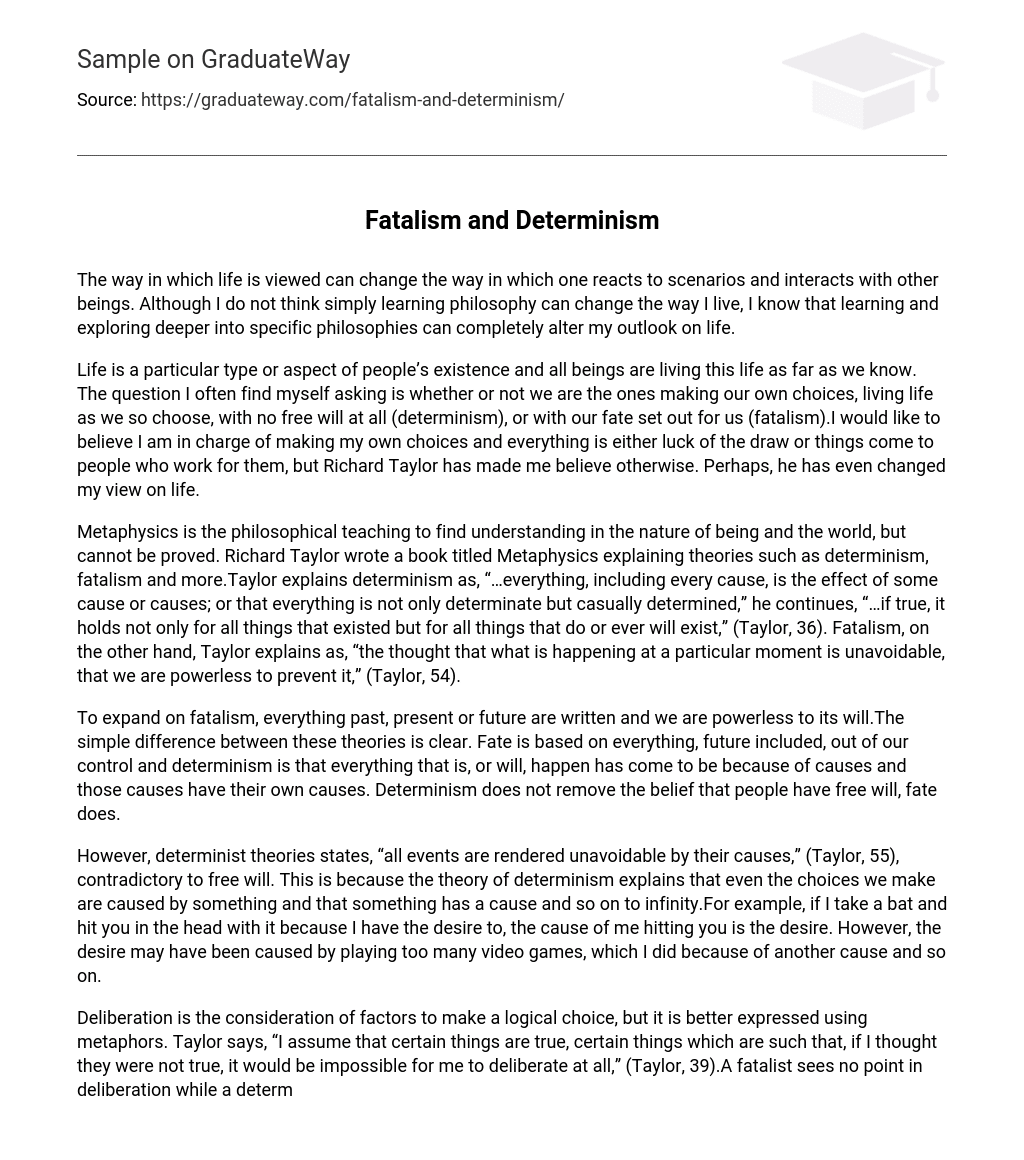The perception of life can influence our reactions to situations and interactions with others. While I believe that studying philosophy alone may not directly impact my lifestyle, delving into specific philosophies can profoundly transform my perspective.
Life is a distinct aspect of being that we, as humans and other living beings, are conscious of. The constant contemplation revolves around whether we have the capability to manage our decisions and live according to our own wishes without any freedom (determinism), or if our destinies are already set (fatalism). From my perspective, I opt to believe that I possess the autonomy to make my own choices and that outcomes are either random or achieved through exertion. However, Richard Taylor’s arguments have challenged my stance and potentially influenced my comprehension of life.
Metaphysics is the philosophical teaching that seeks understanding in the nature of being and the world, but cannot be proven. Richard Taylor explores various theories in his book titled “Metaphysics,” including determinism and fatalism. According to Taylor, determinism suggests that every cause is the effect of some cause or causes and that everything is not only determinate but also casually determined (Taylor, 36). In contrast, fatalism refers to the belief that what happens at a particular moment is unavoidable and that we are powerless to prevent it (Taylor, 54).
Expanding on the concept of fatalism, this idea suggests that all things, regardless of when they occur (whether in the past, present, or future), are predetermined and beyond our influence. These concepts can be differentiated. Fate encompasses everything, including the future which we have no control over, while determinism explains that every event in the past or future is a consequence of preceding causes that also have their own causes. Unlike fate, determinism does not negate the belief in free will.
According to determinist theories, all events are deemed inevitable due to their causes (Taylor, 55), which contradicts the concept of free will. This is because determinism theory suggests that even our choices are influenced by something, and that something has a cause, leading to an infinite chain of causes and effects. For instance, if I were to strike you on the head using a bat because of my desire to do so, the cause of my action is the desire. However, this desire could have been caused by excessive video gaming, which in turn was caused by another factor and so forth.
In terms of decision-making, deliberation involves considering various factors in order to arrive at a logical choice. However, this process can be better expressed through the use of metaphors. In his work, Taylor emphasizes the importance of certain assumed truths that form the basis for deliberation. Without these assumptions, the act of deliberation would be rendered impossible (Taylor, 39). While a fatalist does not see any value in deliberating due to their belief that events are predetermined, a determinist still engages in deliberation to select from limited options, even though external causes may influence these choices. In the fatalist perspective, deliberation is unnecessary because the inevitability of events removes the need for decision-making.
The determinist believes they possess the power to choose an idea over another, but once the decision is made, they realize that the causes influencing their choice were beyond their control. Both fatalism and determinism share the view that deliberation is futile. While these theories differ, they both support the idea that events are predestined and individuals experience things due to either causation or fate. After further examining Taylor’s analysis, I have embraced his beliefs as my own.
The events in my life, whether predetermined or not, prompt me to reassess aspects of my being. This concept has profoundly transformed my perspective on life. Additionally, philosophy has bolstered my faith in God, which previously did not exist, and this too has influenced how I see things. Consequently, individuals who adhere to the belief in an omniscient deity like God are regarded as fatalistic.
According to Taylor, God’s omniscience means that He knows all truths and cannot know anything false (Taylor, 57). If God exists and has complete knowledge, then if He tells someone their exact time, place, and manner of death, His answer would have to be true. So if God knows every single thing that happens—from the smallest event like the birth of an ant to the biggest event like the apocalypse—then His knowledge includes everything.
Believing in God and fate go hand in hand as God has knowledge of all future events, which essentially align with the concept of fate. However, this belief contradicts the perspective of determinists who view all events as random and independent incidents with identifiable causes and effects. In the tale of Osmo, despite his foreknowledge of what lies ahead, he remains unable to evade it.
While this story does not confirm the notion of fate, it does illustrate its inevitability. A determinist would accept this story as evidence because they understand that whatever fate has predetermined will happen regardless of their actions. Knowing the future does not grant the power to alter it. If a determinist believes they can change their destiny by disproving it through their knowledge, their belief itself becomes the cause of what actually transpires.
However, the future he was told turned out to be false, implying that fate or determinism is unprovable. Nonetheless, both of these theories leave one with no control over the future. These persuasive theories confirm the inevitability of the future and have consequently reshaped my overall perspective on life. This is merely one instance of the philosophical theories that have transformed my outlook.
Altering my perspective on life and humanity leads to a transformation in how I approach circumstances and interact with others. Embracing the notion that destined events will unfold in my future regardless of my actions prompts me to act with greater spontaneity and adapt my lifestyle accordingly.





